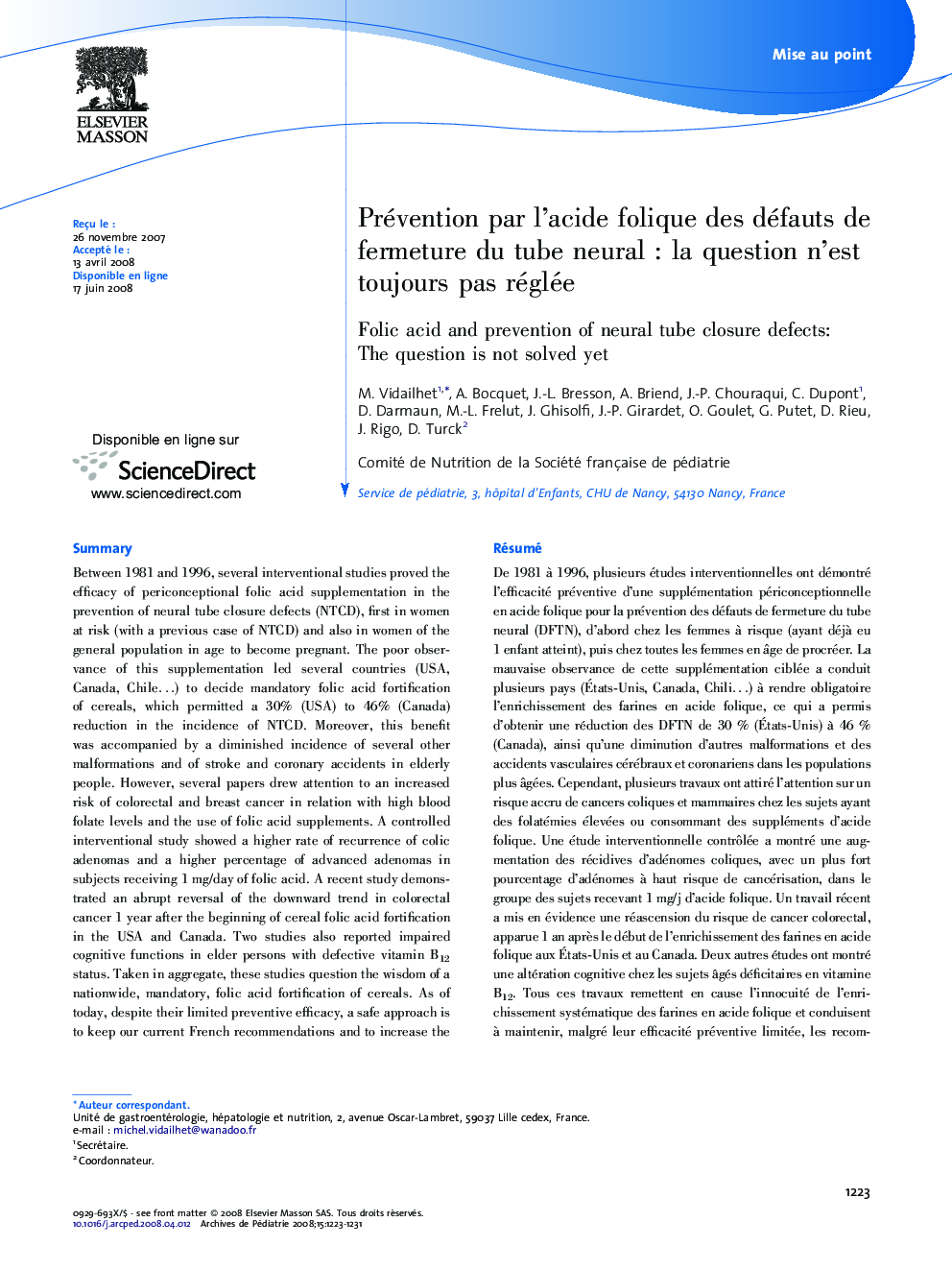| Article ID | Journal | Published Year | Pages | File Type |
|---|---|---|---|---|
| 4149684 | Archives de Pédiatrie | 2008 | 9 Pages |
RésuméDe 1981 à 1996, plusieurs études interventionnelles ont démontré l’efficacité préventive d’une supplémentation périconceptionnelle en acide folique pour la prévention des défauts de fermeture du tube neural (DFTN), d’abord chez les femmes à risque (ayant déjà eu 1 enfant atteint), puis chez toutes les femmes en âge de procréer. La mauvaise observance de cette supplémentation ciblée a conduit plusieurs pays (États-Unis, Canada, Chili…) à rendre obligatoire l’enrichissement des farines en acide folique, ce qui a permis d’obtenir une réduction des DFTN de 30 % (États-Unis) à 46 % (Canada), ainsi qu’une diminution d’autres malformations et des accidents vasculaires cérébraux et coronariens dans les populations plus âgées. Cependant, plusieurs travaux ont attiré l’attention sur un risque accru de cancers coliques et mammaires chez les sujets ayant des folatémies élevées ou consommant des suppléments d’acide folique. Une étude interventionnelle contrôlée a montré une augmentation des récidives d’adénomes coliques, avec un plus fort pourcentage d’adénomes à haut risque de cancérisation, dans le groupe des sujets recevant 1 mg/j d’acide folique. Un travail récent a mis en évidence une réascension du risque de cancer colorectal, apparue 1 an après le début de l’enrichissement des farines en acide folique aux États-Unis et au Canada. Deux autres études ont montré une altération cognitive chez les sujets âgés déficitaires en vitamine B12. Tous ces travaux remettent en cause l’innocuité de l’enrichissement systématique des farines en acide folique et conduisent à maintenir, malgré leur efficacité préventive limitée, les recommandations françaises actuelles en motivant tous les acteurs de santé pour en obtenir la meilleure observance possible.
SummaryBetween 1981 and 1996, several interventional studies proved the efficacy of periconceptional folic acid supplementation in the prevention of neural tube closure defects (NTCD), first in women at risk (with a previous case of NTCD) and also in women of the general population in age to become pregnant. The poor observance of this supplementation led several countries (USA, Canada, Chile…) to decide mandatory folic acid fortification of cereals, which permitted a 30% (USA) to 46% (Canada) reduction in the incidence of NTCD. Moreover, this benefit was accompanied by a diminished incidence of several other malformations and of stroke and coronary accidents in elderly people. However, several papers drew attention to an increased risk of colorectal and breast cancer in relation with high blood folate levels and the use of folic acid supplements. A controlled interventional study showed a higher rate of recurrence of colic adenomas and a higher percentage of advanced adenomas in subjects receiving 1 mg/day of folic acid. A recent study demonstrated an abrupt reversal of the downward trend in colorectal cancer 1 year after the beginning of cereal folic acid fortification in the USA and Canada. Two studies also reported impaired cognitive functions in elder persons with defective vitamin B12 status. Taken in aggregate, these studies question the wisdom of a nationwide, mandatory, folic acid fortification of cereals. As of today, despite their limited preventive efficacy, a safe approach is to keep our current French recommendations and to increase the awareness of all caregivers, so as to improve the observance of these recommendations.
